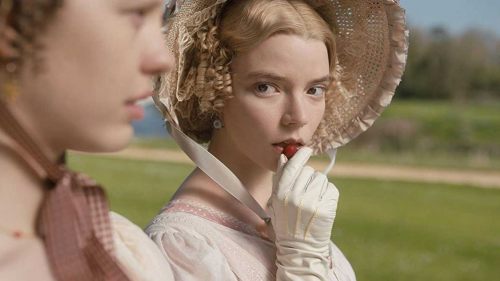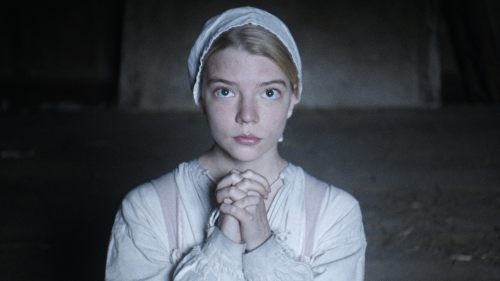EMMA. And The Alluring Oddness Of Anya Taylor-Joy
Emma. is hitting more theaters this week. Get your tickets now!
Anya Taylor-Joy's face – uniquely angular yet still emotionally open – is one of the first images we see in Robert Eggers' stunning debut, The Witch. It’s instantly recognizable, a shock to the system in an otherwise grey world. The actress, who is of Spanish, English, African, Argentinean, and Scottish descent (phew), was then a virtual unknown. Her star-making performance as Thomasin, a young woman struggling to figure life out under increasingly harsh Puritan conditions while the literal devil waits in the wings, showed immense maturity and control.
Those would become calling cards for Taylor-Joy. She stuffed the following four years with roles in movies as varied as sci-fi actioner Morgan, romantic drama Barry, and teen shocker Thoroughbreds. Each offered an intriguing glimpse into the young actress's impressive skill-set and no two performances were the same. In Morgan and Barry, released in quick succession, Taylor-Joy proved she could hold her own even with lacklustre material. As the titular ’bot in Luke Scott's (son of Ridley) underwritten thriller, she uses those razor-sharp features to brilliantly creepy effect. The movie isn't exactly Ex Machina, but Taylor-Joy emerges relatively unscathed; her performance is committed, clearly delineated, and powers the narrative through its weakest moments.
Likewise Barry, a lukewarm study of President Obama's early career that paled in comparison to the sunnier Southside With You, put Taylor-Joy in the girlfriend role, one of just a handful of times she's played such a character (likely because it doesn't energize her artistically to do so). Tasked with facilitating the action rather than getting involved herself, Taylor-Joy nonetheless makes an impression by softening her gaze and communicating her inner warmth in spite of harsh treatment from the titular firebrand. The role was, again, underwritten and borderline thankless given the greater context of the story, but Taylor-Joy imbues her character with an inner narrative all her own. Her prissy Charlotte is empathetic rather than saintly.
Given her untraditional, enigmatic beauty, it's unsurprising horror is where Taylor-Joy has found her niche. Following her breakout turn as Thomasin, she featured in M. Night Shyamalan's split personality thriller Split, as a captured teen whose history of abuse gives her an edge over James McAvoy's killer. She returned for its less successful follow-up, Glass, in which it's queasily suggested that her character feels camaraderie with the man who once held her hostage because they've both...been through some shit?
Typically, the Final Girl is a pure virginal type or, increasingly, in more modern terms, a fierce bad-ass fully in charge of her own sexuality. Split's Casey is neither. She encourages her fellow abductees to piss themselves if their captor tries to rape them while, later, with just a look, the actress confirms Casey has finally found the strength to come clean about the abuse she's suffered and to turn her back on the perpetrator for good. Although Glass relegates her to a glorified background character, at the very least it seems Casey is doing well since her first tussle with The Beast. Even when she isn't the focus, Taylor-Joy radiates confidence and clarity of purpose.
Taylor-Joy's usually light hair is dyed a dark brown to play Casey and her big eyes shine even brighter through its curtains. Her chemistry with McAvoy is stronger than either of her onscreen counterparts, the two actors playing off each other's choices in increasingly entertaining ways. Taylor-Joy holds herself tight like a coiled spring, as though protecting her body from any potential intruders, while McAvoy is straight as a board, hunched over, or full-on Hulking out depending on which personality he inhabits. They're two very different physical performances, existing almost as mirror images to each other. His is reliant on contortion while hers grows taller and more assured as the story charges forward.
Physicality is a key aspect of Taylor-Joy's style. As The Witch's Thomasin, she goes from brattily towering over her kid brother to sensuously disrobing and flying off with the devil, a smile, barely perceptible at first, playing on her lips that spreads to her cheeks as newly-found freedom envelopes her. In many of Taylor-Joy's roles, the actress starts off smaller, in both stature and projection. As the character's strength grows, so too does her confidence in standing up tall and speaking louder. She's intensely aware of where the camera is, also, whether staring down a serial killer or trying to convince regular humans of her own autonomy as a robot creation.
Although Marrowbone was less of a capital-H horror movie than The Witch or Split, it again gave Taylor-Joy the opportunity to utilize her inherent self control to communicate a steely core. As the well-off paramour of George Mackay's lowly family-man, she's warm and inviting but still prim and proper. There's a keenly-felt goodness to everything Taylor-Joy does, right down to her voice-work in The Dark Crystal: Age of Resistance and Playmobil: The Movie. Here, warmth radiates from her once again. There are flashes of pain in those big eyes in Marrowbone, however, as her Allie comes to realize what's happening on the outskirts of society, in houses less grand than her own.
Period styling gives Taylor-Joy armour to work with, whether it’s Puritan or modern chic. Thoroughbreds affords Taylor-Joy the opportunity to play her darkest character yet (again with dark, poker-straight hair) as a well-dressed society lady with a penchant for murder and mayhem, manipulating the troubled young woman she's tasked with tutoring (fellow Brit Olivia Cooke). This performance, more so than any other, showcases the remarkable depth of her talent. She manages to be simultaneously inviting, horrifying, gorgeous, manipulative, and empathetic. Although Lily's biggest problem is her domineering stepfather (as opposed to Split's Casey, whose living situation is an entirely different kind of unsafe), she's such a natural queen bee it's hard not to root for her success.
When Cooke's Amanda willingly takes the fall for Lily, it speaks both to her own mania but also her admiration for, and borderline obsession with, Lily. She wants to impress her and be friends with her at all costs. We believe it because Taylor-Joy essays such effortless coolness with just a flick of her eyelashes. Thoroughbreds' most memorable image sees the two ladies outdoors playing giant chess, except only Amanda is really playing as Lily sits off to the side, wearing a stunning pair of designer sunglasses and looking a bit bored. This performative boredom is symptomatic of a character who can't even be bothered to do her own dirty work but, when Lily emerges victorious at the end of the movie, we're still rooting for her.
Thoroughbreds introduces Lily as she's lying to Amanda's face, pretending to be nicer and more invested in her schooling than she actually is. Taylor-Joy spreads the smile too wide, as though her cheeks are hurting, but those big eyes betray an inner darkness; there's no warmth in her. She drops the pretense almost immediately; confident in the fact she can do less than the bare minimum and still get away with it. In fact, the only time Lily's veneer cracks, it really cracks as, confronted by her horrid stepfather, her eyes filled with tears, she's forced to reckon with the hollow, vain, shallow person she truly is. If only he knew what Lily was truly capable of, maybe he'd be less quick to push her.
Weirdly, Thoroughbreds stands as a precursor of sorts to Emma., Taylor-Joy's first proper leading role, and the best example yet of her distinctive talents in front of the camera. Again playing a spoilt society lady with little in the way of actual problems, she relishes in the fussy trappings and harsh angles of period dress. Here, though, Taylor-Joy is blonde again, which saps her enigmatic features of the darkness present in Casey or Lily. She's brighter, lighter, and more prone to sunny outbursts. Emma's sole moment of real cruelty is so shocking precisely because Taylor-Joy has lulled us into such a sweet, hazy, almost dream-like state with her irresistibly lovely performance. Even when she's bitching behind people's backs, we still like her. But, by giving in to her inner mean girl, Emma exhibits an expertly-concealed darkness no amount of make-up or pretty dresses could hide.
In a recent interview on the Wittertainment podcast, Taylor-Joy admitted to having an intense relationship with her characters. Describing herself as obsessive but not Method, she explained her desire to understand whoever she's playing regardless of how difficult it might be. This empathy shines through in every performance, whether she's a spoilt mean girl or a lonely teen led astray by Satan. Taylor-Joy isn't chameleonic – her features are too wonderfully quirky for that – but she disappears into difficult and complex characters in a way few others in her age bracket (Riverdale's Lili Reinhart, Chloe Grace Moretz, who somehow pipped her to the post as Wednesday Addams in the animated Addams Family – a travesty) can manage. She's a delightfully strange prospect and a thoroughly unique screen presence, who has only scratched the surface of her talents. That is the true beauty of Anya Taylor-Joy; the best is surely yet to come.



